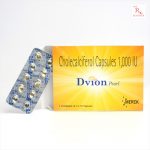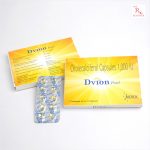
| Dosage | : | Capsule |
| Contains | : | Cholecalciferol IP (Vitamin D3) – 1,000 IU |
| Category | : | Dietary supplement |
| Uses | : | Vitamin D deficiency |
| Price | : | Rs. 146.82 (Pack of 10 Capsules) |
Dvion Pearl contains Vitamin D. It is used and administered for the prevention and treatment of Vitamin D deficiency.
It is World’s first Vitamin D innovated by Merck Limited in the year 1927. The global presence of the brand is with the name Vigantol and in Germany it is present as Vigantoletten.
Dvion Pearl is manufactured under stringent quality standards and is available in oil-based pearl formulations and drops. The Pearl shape makes it easy to swallow and the oil-base aids better absorption of Vitamin D compared to the powder form.
Active Ingredients & Packaging
Cholecalciferol IP (Vitamin D3) – 1,000 IU
Marketing & Manufacturing
Marketed by: Merck Limited
Address: Shiv Sagar Estate ‘A’, Dr. Annie Besant Road, Worli, Mumbai – 400018
Manufactured by: Indchemie Health Specialities Pvt. Ltd.
Address: Plot No. 7, OIDC, Mahatma Gandhi Udyog Nagar, Dabhel, Daman – 396210
Price
Dvion 1,000 IU: Rs. 146.82
Other Variants
Vitamin D helps your body absorb calcium that is the main building blocks of a bone. Vitamin D also plays an important role in nervous, muscle, and immune systems.
Vitamin D is synthesized in skin on exposure to the sunlight (UVB rays). Despite plentiful sunshine in India, 70-100% Indian population suffers from Vitamin D deficiency. It is the most under-diagnosed and under-treated nutritional deficiency globally.
Vitamin D deficiency leads to weakened and brittle bones that can break easily. Vitamin D deficiency is also noted in many chronic diseases like infectious diseases, autoimmune diseases, cardiovascular diseases, diabetes and cancer.
Commonly observed symptoms of Vitamin D deficiency are tiredness, back pain, aching bones, falls and fractures, infections.
Sources of Vitamin D are milk, fish oil, yeast, mushrooms etc.
Recommended Dosage:
Intake of 60,000 IU of Vitamin D3 per week can be taken for a short duration, for patients with severe vitamin D deficiency. Vitamin D ≤ 4000 IU/day is advised for otherwise healthy individuals.
Know your normal levels:
At serum 25(OH)D level of 30 ng/mL intestinal calcium absorption reaches its peak.
Desirable and safe level of Vitamin D: Serum 25(OH)D level: Between 30–100 ng/mL.
Vitamin D sufficiency: Serum levels of 25(OH)D: Between 30–32 ng/mL.
Consult your Physician if your Levels of Vitamin D are as follows:
Vitamin D deficiency: Serum 25(OH)D level: <20 ng/mL
Vitamin D insufficiency: Serum 25(OH)D level: Between 20–29 ng/mL.
Investigating Vitamin D levels:
Vitamin D levels in an individual can be analysed by blood tests.
Plasma 25(OH)D [25-hydroxy vitamin D blood test] OR
Calcidiol levels are the most reliable marker of vitamin D status.
Ref: https://www.ncbi.nlm.nih.gov/pmc/articles/PMC3942730/
Indication
Prevention & Treatment of Vitamin D Deficiency
Safety
Consult your Physician to know more
Dosage
As Prescribed by the Physician
Method of Usage
Consult your Physician to know more.
Administration
To be administered orally.
Adverse Reactions/ Side Effects
Vitamin D analogs are well tolerated in recommended daily doses. Chronic excessive dosing can lead to Hypervitaminosis, characterized by effects on the following organ system:
- Renal: Impairment of renal function with polyuria, nocturia, polydipsia, hypercalciuria, reversible azotemia, hypertension, nephrocalcinosis, generalized vascular calcification, or irreversible renal insufficiency, which may result in death.
- CNS: Mental retardation.
- Soft Tissues: Widespread calcification of the soft tissues, including the heart, blood vessels, renal tubules, and lungs.
- Skeletal: Bone demineralization (osteoporosis) in adults occurs concomitantly. Decline in the average rate of linear growth, increased mineralization of bones in infants and children (dwarfism), vague aches, stiffness, and weakness.
- Gastrointestinal: Nausea, anorexia, constipation.
- Metabolic: Mild acidosis, anaemia, weight loss.
Warnings and Precautions
Keep out of the reach of children. Chronic or acute administration of excessive doses may lead to hypervitaminosis D, manifested by hypercalcemia and its sequelae. Periodic monitoring of serum calcium, phosphate, magnesium, and alkaline phosphatase is recommended for patients taking vitamin D analogs. For the protection of the foetus, the use of vitamin D in excess of the recommended dietary allowance during normal pregnancy & lactation should be avoided. Use with caution in elderly.
Contraindications
Known hypersensitivity to vitamin D3, hypercalcemia, malabsorption syndrome, abnormal sensitivity to the toxic effects of vitamin D and hypervitaminosis.
Drug Interactions
Consult your Physician to know more
Overdosage
Consult your Physician to know more.
Storage
Store at a temperature not exceeding 25°C. Protect from light and moisture.
Disclaimer
Data provided by Merck Limited.
References
- Shah BR, Finberg L (September 1994). “Single-day therapy for nutritional vitamin D-deficiency rickets: a preferred method”. J. Pediatr. 125 (3): 487–90. doi:10.1016/S0022-3476(05)83303-7. PMID 8071764. https://www.ncbi.nlm.nih.gov/pubmed/8071… – Accessed: June 14, 2018.
- WHO Model Formulary 2008 (PDF). World Health Organization. 2009. p. 496. ISBN 9789241547659. Retrieved 8 December 2016. http://apps.who.int/medicinedocs/documen… – Accessed: June 14, 2018.
- NHS Choices. What should I do if I miss a dose of antibiotics? – Accessed: June 14, 2018.
- Ever Miss a Dose of Your Medicine? – Accessed: June 14, 2018.
- Net (2014). The Importance of Taking Your Medication Correctly – Accessed: June 14, 2018.
- Schachter, S.C., Shafer, P. O. &; Sirven, J.I. (2013). Missed Medicines. Epilepsy Foundation – Accessed: June 14, 2018.
- National Institute of Drug Abuse (2010). Prescription Drugs: Abuse and Addiction. Report Research Series – Accessed: July 21, 2016.
- eMedicinehealth (2016). Drug Overdose Overview – Accessed: June 14, 2018.
- Centers for Disease Control and Prevention (2010). Unintentional drug poisoning in the United States – Accessed: July 21, 2016.
- Centers for Disease Control and Prevention. December 12, 2011. Put your medicines up and away and out of sight – Accessed: June 14, 2018.
- The Center for Improving Medication Management and the National Council on Patient Information and Education. The quick scoop: medicines and your family: safely storing and disposing of medicines – Accessed: June 10, 2016.
- S. Food and Drug Administration. December 24, 2013. How to dispose of unused medications – Accessed: June 14, 2018.
- World Health Organization: Information sheet: Pharmaceuticals in drinking-water – Accessed: July 1, 2016.
- Lyon, R. C., Taylor, J. S., Porter, D. A., et al. (2006) Stability profiles of drug products extended beyond labeled expiration dates. Journal of Pharmaceutical Sciences; 95:1549-60 – Accessed: July 3, 2016.
- Harvard Medical School (2016). Drug Expiration Dates – Do They Mean Anything? – Accessed: June 14, 2018.
70 – 100% of Indian Population suffers from Vitamin D deficiency that is prevalent in Infants, Adolescents, Elderly, Pregnant and lactating women.
Research says that people are not even aware of Vitamin D deficiency and its ill effects. Deficiency of Vitamin D can trigger serious diseases such as rickets, osteoporosis, cardiovascular diseases, diabetes, cancer and infections such as tuberculosis. Vitamin D is necessary for maintaining blood levels of calcium, normal mineralization of bone, muscle contraction, nerve conduction and general cellular function in all cells of the body.
In India, widely consumed food items such as dairy products are rarely fortified with vitamin D and our lifestyle does not even support the exposure to the freely available source, the ‘Sun’.
Hence, it is highly important to maintain the right level of Vitamin D.
What causes vitamin D deficiency?
Vitamin D deficiency can be due to different reasons:
- Lack of enough vitamin D in your diet
- Absorption of Vitamin D is low in your body.
- Poor exposure to sunlight.
- Your liver or kidneys are unable to convert vitamin D to its active form in the body.
- You are on medicines that interfere with body’s ability to convert or absorb vitamin D
How can you get enough Vitamin D?
You can get Vitamin D from 3 sources, through your skin, diet and supplements.
Through Skin:
Vitamin D is naturally formed in body after exposure to sunlight.
From Diet:
There are some foods that naturally have some amount of vitamin D. Do consult your Physician to know more.
From Supplements:
Consult your Physician to know more







